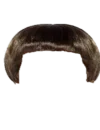Aldous Huxley was born in Godalming, Surrey, England in 1894. According to Nicholas Murray, Huxley was “immensely tall – six feet four-and-a-half inches”, and he had a voice that was “beautifully modulated, silvery, precise”. His mother, Julia Huxley, died “of an inoperable cancer after a very short illness” in 1908. This greatly impacted Huxley, and Murray claims that the pain of the loss is apparent in Huxley's literature. As evidence, he argues that “in both Brave New World and its counterpart, the ‘good utopia' of Island, the nature of motherhood and the role of the family is an important theme, and one informed by Huxley's complicated feelings about the matter reaching back to his childhood experiences”.
Huxley would not avoid health problems of his own. His school attendance was not consistent because he “was ill as a child and missed some of his lessons”. When Huxley was sixteen and attending Eton College, he began experiencing pain in his eyes and he was taken to an eye specialist in London. It was determined that he had a condition known as keratitis punctata, and although doctors did their best, he was left blind from 1911 to 1912, and his sight was impaired from then onwards. His sight impairment was devastating because he was “a voracious reader, a painter, a delighted explorer of the natural world” and, according to Murray, “it was a catastrophe which he always believed was the most important single determining event in his early life”. Interestingly, George Woodcock notes that Huxley's seeing impairment was accompanied by aphantasia, and he “could remember scenes, but he could not create a scene by invention in his mind's eye”. Huxley writes about his experiences with near blindness in The Art of Seeing (1943).His sight problems may have been unexpectedly serendipitous because “realising that a medical or scientific career was now out of the question, Huxley turned to the idea of writing”. He read voraciously using braille and a magnifying glass, and he also learnt to play the piano by touch. His loss of sight may have also sparked his search for alternate ways to view the world, ultimately fuelling and shaping his views and interactions with psychedelics. When he was seventeen, he published his first text titled Crome Yellow in 1921. One of his most impactful texts is Brave New World (1932), a dystopian text that imagines a future where society is bioengineered and conditioned with the aim of crafting a perfect utopia.
In 1937, Huxley and his family moved to California, USA. During this time, there are “oriental elements that became increasingly preponderant in his religious attitudes”, and this is seen in writing. As Woodcock points out, in Island Huxley crafts a society with a “religio-philosophic basis combining Indian and European elements”. In the 1950s, Huxley began experimenting with psychedelic drugs. He “had heard, since coming to the United States, circumstantial reports of the use of the cactus known as peyote in the ceremonials of a semi-pagan Indian church in New Mexico”. While some view psychedelics as a psychosis simulator and others view them as recreational substances, Huxley instead saw them as spiritual helpers. As Woodcock explains, “he realised that the ways to enlightenment were many; that prayer and meditation in themselves were only techniques, and that there could be other techniques – mortification was one of them – which might effectively break down the resistance of the Ego”.
The doors of perception
The phrase “the doors of perception” is originally found in William Blake's text The Marriage of Heaven and Hell (1790). Within the text, it is written that “if the doors of perception were cleansed everything would appear to man as it is, Infinite”. This carries a similar message to what The Doors of Perception argues with regards to psychedelics. Huxley's reference to Blake is no mistake, and he displays a constant fondness for the Romantic artist through his references to him, and titling an essay “Heaven and Hell”, making yet another allusion to Blake.
The Doors of Perception can be considered psychedelic due to the way Huxley handles the topic of drug use. The text is presented as an autobiographical account of the author's experiences, and he attempts to make himself appear as a man who is using psychedelics for the sake of science and knowledge rather than hedonism. Like psychedelic writers before him, he assumes the role of the psychonaut who aims to explore unvisited realms of human consciousness. Huxley, with his scientific tone and his philosophical musings regarding psychedelics and their social and spiritual potential, plays the role of the psychonaut quite convincingly, and his eloquence allows him to discuss even his most abstract thoughts.
Mescaline
Huxley's drug of choice is mescaline. As previously discussed, the use of mescaline is usually associated with Native Americans who have used it for generations for spiritual purposes. Huxley is aware of the relationship Native Americans have had with the drug, and he also discusses how Native Americans have appropriated customs and rituals of the past to still carry meaning in the modern world. As an example, he looks to the Native American Church which has been discussed in this thesis. Following the colonisation of the Americas, Native Americans had to deal with Christianity's encroachment on their culture. In many countries that have experienced European colonisation, Christianity often becomes the dominant religion that moulds many aspects of life including culture, morality, and law. In the process, the culture of the natives is erased. Rather than fight the overwhelming tide of Christianity, Huxley notes that some Native Americans instead did “something which is at once psychologically sound and historically respectable” and incorporated some of the fabric of Christianity into their cultural beliefs and customs. This can be seen in the way the use of peyote has been sacramentalised in a Christian fashion by the Native American Church. As Huxley explains, the church's “principal rite is a kind of Early Christian agape, or love feast, where slices of peyote take the place of bread and wine”. Hence, while Christians experience rebirth by taking part in the symbolic resurrection of Christ through communion, members of the Native American Church use mescaline instead for the same ends. The effects of mescaline are interpreted as religious and spiritual experiences and the Native Americans occasionally “see visions, which may be of Christ Himself”.
Huxley speaks positively of the Native American Church, and he lauds them for seeking “the best of both worlds, indeed of all the worlds – the best of Indianism, the best of Christianity”. However, Huxley does not spend much time using Native American worldviews to understand mescaline, nor does he use Native American myths and folktales to make sense of his psychedelic experiences. Instead, Christianity is the religion he mostly uses to frame his experiences. He makes use of Christian language and imagery, and he refers to Christian parables, including the story of Mary and Martha. This is not unexpected for Huxley, whose life in the United Kingdom and the USA would have chiefly exposed him to Christianity. His understanding of both Christian and Native American belief systems goes a long way to shedding light on the prevailing socio-religious climate in the USA during Huxley's time of writing. For instance, by highlighting the Native American Church, Huxley also brings to light the ways Native Indian belief systems in America were undermined by Christianity brought in by European settlers and how, while some Native Americans did try to form a new hybrid culture, others “reacted to white supremacy by becoming Americanised”.
Huxley treats his experiments with psychedelics as a scientific endeavour. This is seen, for example, when he introduces his experimentation with mescaline in quite a scientific manner. He uses precise language, including stating the date and exact dosage he took. In May 1953, Huxley is visited by a friend who is researching mescaline, and he allows Huxley to be his guinea pig. Huxley agrees and consumes four-tenths of a gram of mescaline dissolved in half a glass of water before patiently waiting for the effects. The objective, scientific tone of the text is further magnified by the fact that Huxley, after consuming mescaline, records his conversations on a “dictating machine”. Throughout the text, Huxley makes several scientific observations, and he posits theories on how mescaline might alter one's consciousness. He hypothesises that mescaline “interferes with the enzyme system that regulates cerebral functioning”. Consequently, it lowers the “biological efficiency of the brain” and permits the entry into consciousness “certain classes of mental events, which are normally excluded”.
One of the ways he establishes a scientific tone is by inserting himself onto the end of a long chain of prior psychonauts and scholars. He begins his research by stating that “it was in 1886 that the German pharmacologist, Louis Lewin, published the first systemic study of the cactus”, then continues by pointing out that “such eminent psychologists as Jaensch, Havelock Ellis, and Weir Mitchell began their experiments with mescalin, the active principle of peyote”. Displaying his scientific knowledge of the drug, Huxley explains that “chemists have not merely isolated the alkaloid; they have learned how to synthesize it”. He is also aware of how the drug garners interest from various fields of study including psychiatrists, philosophers, “neurologists, and physiologists”. By discussing his predecessors and outlining the body of scientific knowledge of peyote, he portrays himself as scientifically learned and positions himself as yet another psychonaut in a long line of experimenters.
Whether intentional or not, Huxley's scientific approach adds a subtle layer of humour to his text when it is applied to the most mundane of observations. A notable example of this occurs when Huxley stares at his trousers and notices “those folds in the trousers – what a labyrinth of endlessly significant complexity! And the texture of the grey flannel – how rich, how deeply, mysteriously sumptuous!”. He has a similar experience when staring at draperies, causing him to conclude that “for the mescalin taker draperies are living hieroglyphics that stand in some peculiarly expressive way for the unfathomable mystery of pure being”. What might have been a forgotten observation suddenly becomes a scientific quandary, and in an attempt to solve it, he hypothesises that perhaps “the forms of folded drapery are so strange and dramatic that they catch the eye and in this way force the miraculous fact of sheer existence upon the attention? Who knows?”.
Despite his scientific approach, he also occasionally makes use of mysticism in his writing. This is seen through his several references to religion, especially Christianity. For example, when he attempts to explain negative experiences, he compares them to Dante's Inferno, an epic poem that imagines the Christian Hell as an abyss comprised of nine circles. Huxley also juxtaposes positive and negative psychedelic experiences by referring to them as Heaven and Hell, respectively. Thus, as has been the case with his predecessors, Huxley's psychedelic writing disrupts the usual boundaries between different modes of observation and blends the scientific with the poetic. Boon's research on Huxley suggests that the intermingling of the subjective and the objective in The Doors of Perception may be a product of Huxley's life and upbringing because he “came from a background in which literary and scientific pursuits had long coexisted”.
It should be noted that while Huxley does make use of mysticism, and though he does give into trailing thoughts and subjective language when describing psychedelic experiences, he does so to a lesser degree than his fellow psychedelic writers, including Ludlow. Comparatively, Huxley is far more lucid than his predecessors, and this is seen, for example, when, during a moment of navel-gazing, he states that “by its nature every embodied spirit is doomed to suffer and enjoy in solitude. Sensations, feelings, insights, fancies, – all these are private and, except through symbols and a second hand, incommunicable”. He suggests that while humans may attempt to socialise, the human experience is ultimately a solitary one, as our experiences can only be shared through secondary means, and tools such as language can never fully communicate one's internal experiences. His remark echoes the kind of philosophizing emblematic of psychedelic writers who are tasked with describing the most exotic internal experiences, but Huxley can put forward a coherent thought without dipping into language that is too strange and imagery that obfuscates.
Huxley and Psychedelics
Like prior psychedelic writers, Huxley displays a positive attitude towards psychedelics, and this view does not change from the start to the end of The Doors of Perception. He does not see an issue with the regular use of mescaline, and he claims that reports by Dr Slotkin reveal that peyote users are “on the whole more industrious, more temperate (many of them abstain altogether from alcohol), more peaceable than non-peyotists”. He views the drug as superior to legal substances such as alcohol and tobacco which he believes are a detriment to society. However, he does not advocate for the banning of alcohol and cigarettes, and instead, he argues that by introducing the public to psychedelics, they could “exchange their old bad habits for new and less harmful ones”. Mescaline may be the drug to do this because, as Huxley notes, “unlike alcohol, it does not drive the taker into the kind of uninhibited action which results in brawls, crimes of violence and traffic accidents”. He also stresses the harmlessness of psychedelics, and claims that “to most people, mescalin is almost completely innocuous”.
Although he sings the praises of mescaline, he is not entirely blind to its negative aspects. He notes that while mescaline is safer than most legal and illegal drugs, it is “not yet an ideal drug”. This is partially because, while many who consume mescaline will find sublime splendours and deep contemplation, there are a select few who find “in the drug only hell or purgatory". Although he presents mescaline as an alternative habit to alcohol and tobacco, he does not think that it is a perfect replacement because “for a drug that is to be used, like alcohol, for general consumption, its effects last for an inconveniently long time".
To Huxley, mescaline is a solution to a problem. He poses this problem to the reader by asking the following question: “short of being born again as a visionary, a medium, or a musical genius, how can we ever visit the worlds which, to Blake, to Swedenborg, to Johann Sebastian Bach, were home?”. To solve this problem, he hopes that mescaline will admit him “at least for a few hours, into the kind of inner world described by Blake”. Hence, in many ways, his motivations are that of the classic psychonaut, as he chiefly desires to explore anomalous states of consciousness.
To better understand Huxley's aims with mescaline, one would need to grapple with how he conceives of human consciousness. In Huxley's view, the human mind is capable of remembering everything that has ever happened to it and perceiving “everything that is happening everywhere in the universe”, a belief inspired by the Cambridge philosopher Dr C.D. Broad, who in turn is inspired by Bergson. However, much of the content consumed by the brain is “largely useless and irrelevant”. Hence, to assist humans, who are biological organisms geared towards survival, the brain, and the nervous system will shut out most of what is perceived, “leaving only that very small and special selection which is likely to be practically useful”. Hence, the brain and the nervous system can be thought of as a reducing valve that gives us “a measly trickle of the kind of consciousness which will help us to stay alive”. Some special individuals, however, can bypass this limiting valve to perceive more than the average person. These are the creatives and the spiritually enlightened through whose eyes Huxley aspires to see, though he plans to do it through mescaline. Huxley's ideas may have some psychoanalytical basis. The previously discussed Freudian concept of repression may be thought of as a form of reality narrowing in service of the Ego. However, this narrowing can be expanded through the use of psychedelics which, as C.J. Healy's research reveals, have been noted by clinicians to unearth repressed childhood memories.
Although The Doors of Perception is a popular text, there were several criticisms of it at the time of its release. As is to be expected, many critics chastised the text for its drug-centric nature. The ethnologist Weston La Barre claimed Huxley looked upon mescaline with the “Romanticism-ensorcelled eyes of Europeans” while the Oxford professor R. C. Zachner took umbrage at Huxley comparing his drug experiences to those of great mystical traditions. Huxley did have plenty of critics who praised him, however, and he has been celebrated by psychedelic writers who have come after him. In High Priest, Leary speaks of reading Huxley repeatedly before finally meeting him and describing him as a “wise and good man”.
The Doors of Perception is a highly influential text that has gone on to affect not just psychedelic literature, but also public perceptions of psychedelics. The text drew attention to itself due to the way it presents a psychoanalytic approach to psychedelic experiences and posits psychonautics as an intellectually valuable pursuit in the West as opposed to a merely esoteric cultural trait of primitive exotic cultures or a pastime of degenerates. Huxley was also influential in inspiring others to share their own psychedelic experiences. According to Boon, the late 1950s saw a large increase of “Huxley-inspired accounts of LSD and mescaline”.
Conclusion
Wewlad that was a long one. I hope you enjoyed it. Tune in next time when I discuss Hunter S. Thompson or circumcision or some shit.
















Jump in the discussion.
No email address required.
I had no idea that Huxley was vision-impaired (I've never read him). It must have taken huge courage to experiment with psychedelics given his condition. They freak me out enough, and I can see!
One of your best posts yet. I love you, OP.
Jump in the discussion.
No email address required.
More options
Context